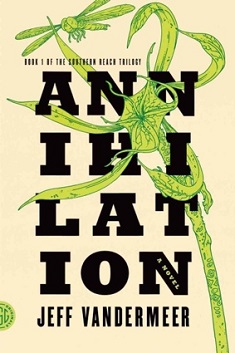
Annihilation
Jeff VanderMeer
208 pages
published in 2014
Last year Jeff VanderMeer (or rather his publisher) did something rarely done, releasing an entire trilogy in one year. Annihilation is the first of this Southern Reach trilogy and has gotten steady buzz as one of the shoe-ins for Hugo and Nebula nominations; it already managed the latter, in fact. VanderMeer is arguably the father of the American New Weird, that mid-noughties movement that came bubbling up from England and got codified across the pond, mainly through his and Ann VanderMeer’s contributions. I’ve only read one story of his before this, the deliberately confusing The Situation.
Annihilation is a much more straightforward story, of a four woman expedition into Area X, as told by the biologist through her field journal; the other three members are the anthropologist, the surveyor and the psychologist. Their names are never told: “names belonged to where we had come from, not to who we were while embedded in Area X”. They’re the twelfth such expedition into the Area; the previous eleven all came to grief one way or another. What they’re setting out to discover is left vague; they themselves only know in general terms what they’re doing or what they can expect, though the psychologist seems to know more than she lets show.
Because I’ve read it only recently, the comparison with Arkady & Boris Strugatsky’s Roadside Picnic was in the back of my head almost from the start of the story, as well as with the genre of horror survival games it inspired. Area X is devoid of human life, supposedly depopulated through an unspecified eco disaster though that’s only a cover story, but at first glance only looks like a well established wilderness park, signs of most human life almost disappeared, save for the lighthouse on the coast.
It’s only on the second day that the expedition finds the first truly alien entity in the Area, a tunnel, spiral staircase into the ground which the biologist can’t help but see as a tower. At first she sees this as a built, artificial tunnel, but an accidently inhalation of spores growning on the tunnel/tower’s walls shifts her perception and she starts to realise the psychologist has hypnotised them to shield them from the truth. But what she can’t shield the expedition from is the writing on the tunnel walls:
“Where lies the strangling fruit that came from the hand of the sinner I shall bring forth the seeds of the dead to share with the worms that gather in the darkness and surround the world with the power of their lives while from the dim lit halls of other places forms that never were and never could be writhe for the impatience of the few who never saw what could have been.
Who or what is writing this and why is the central mystery driving Annihilation as the expedition falls apart until only the biologist remains. She has an ulterior motive for taking part, as her husband was part of the eleventh expedition. He came back altered and she hopes to find out something about what happened to him.
Meanwhile, as the expedition unravels, she also finds herself reflecting on her own life and past, which is just as gripping as the slow unravelling of the mystery of Area X and like it, there are no easy answers to how she became the woman she is, just a steady building awareness of something gone wrong, until she finds herself in the Area. It adds a melancholic element to Annihilation, a sense of options closed off and roads not taken.
There isn’t any real horror, an evil lurking behind Area X, there is at first glimpse not even anything stranger than a wilderness area that’s both more wild and more clean than it should or could be. Nevertheless there’s the sense of dread that builds up throughout the story, an awareness that something has gone wrong and that more has happened than is acknowledged. And as with Roadside Picnic, it’s unclear if there is a central intelligence behind the change, or whether it’s something natural.
And I didn’t find it scary while reading it, but this was still the sort of story that cost sleep after I’d finished it on Sunday night, as I kept thinking about it half asleep. Not many books can do that. It will be interesting to see what VanderMeer does in the other two books in the trilogy.
No Comments